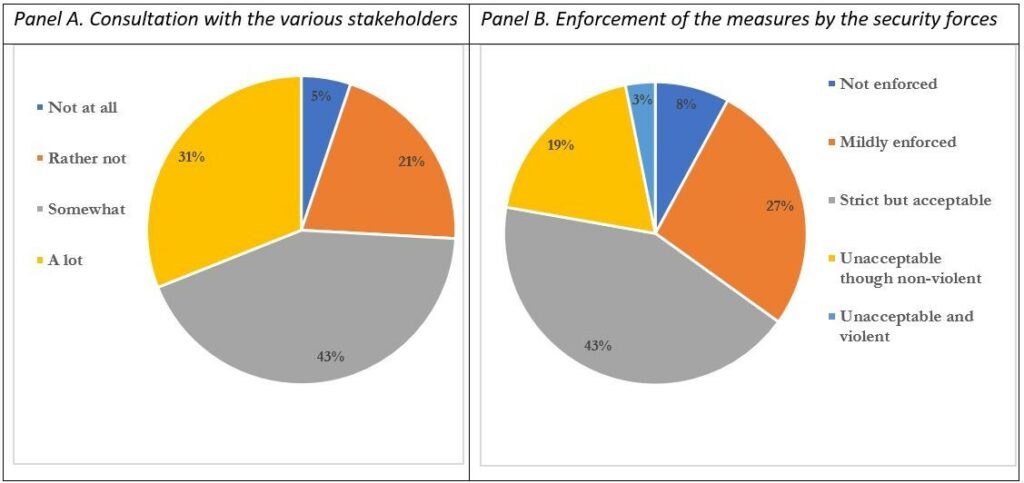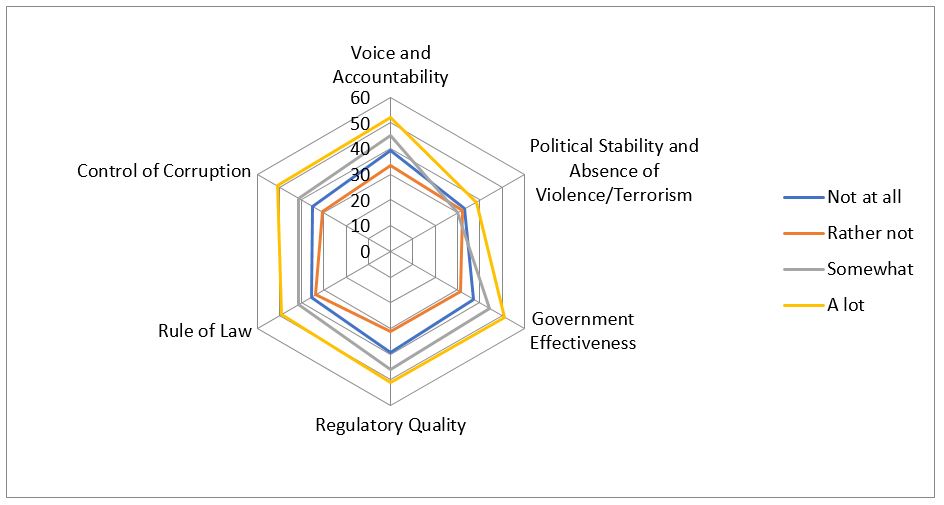Which measures have been taken around the world to contain the spread of CoViD-19? What is the level of popular support for these measures in different countries? How are they enforced? How did different countries make the decisions on which measures to take? We asked our 1158 IOB alumni and our 77 current IOB students. Collectively we researched these topics. Additionally, we asked them about the economic, socio-political and gendered impact of the pandemic and the containment measures.
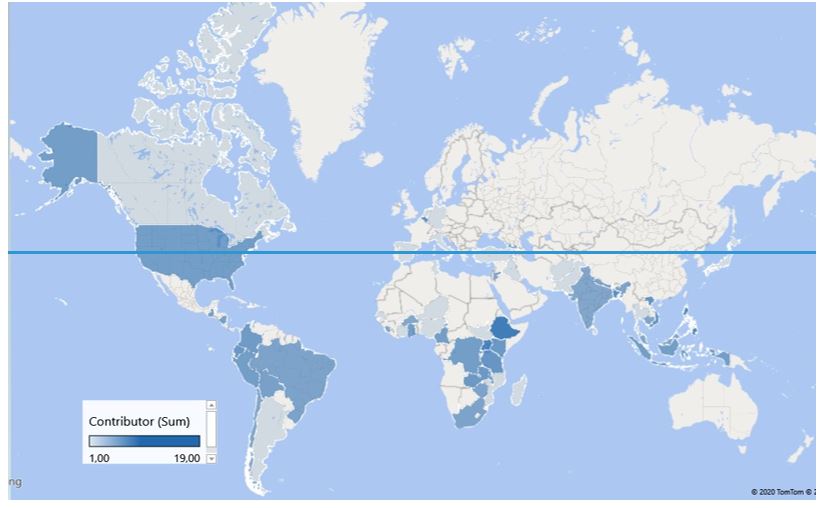
Contributors and Countries
We received responses from 193 alumni and 25 students. The contributors could choose on which country they would report. 84 per cent chose to report on their country of origin, while 16 per cent chose to report on their country of residence. Figure 1 shows the countries on which we received contributions, and the number of contributions per country.
On average, contributors are 38 years old and 45% are women. Many of them work in international organizations or NGOs (38%), in academia (23%) and for the government (22%). A smaller proportion is self-employed or works in the private sector (14%); 11% are still students.
Measures taken, adoption and popular support
We conducted an online survey, asking about 17 possible measures to contain CoViD-19. Figure 2 shows the share of countries in our sample that adopted a specific measure, how strictly that measure was adhered to on average, and the level of popular support for each measure, all as perceived by the respondents.
On average, countries have taken 14.3 measures. The promotion of washing hands (97%) and of social distancing (95%) are the most frequently employed measures. They are followed by the closing of universities, schools, and international borders (94-95%), the suspension of religious gatherings (94%), the closing of hotels, restaurants and bars (92%), and mask wearing requirements (90%). The vast majority of countries also restricted movements between regions (84%), and ordered the closing of non-food shops (79%). A smaller share of countries, but still more than half, closed informal food markets (70%), imposed a curfew (65%) and suspended public transport (59%).
Measures were adhered to ‘Rather strictly’, with an average score of 3.2 on a scale of (1) Not at all strictly, to (4) Very strictly. The citizenry was ‘Rather supportive of measures’, on average, also with a score of 3.2 on a scale of (1) Not at all to (4) Very supportive. Some measures enjoyed maximum support (e.g. closing of universities, secondary and primary schools; hand washing) while other measures have been more unpopular (e.g. curfew; closing of food markets and shops; suspension of public transport).
High dependency on informal employment and high rates of poverty explain the lack of widespread popular support for some measures, according to our key informants. Additionally, a poor understanding of the disease combined with ambiguous political communication about the pandemic contribute to a lack of support. Here are some telling quotes:
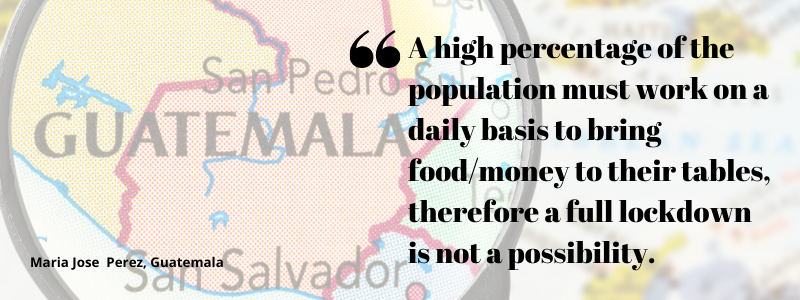
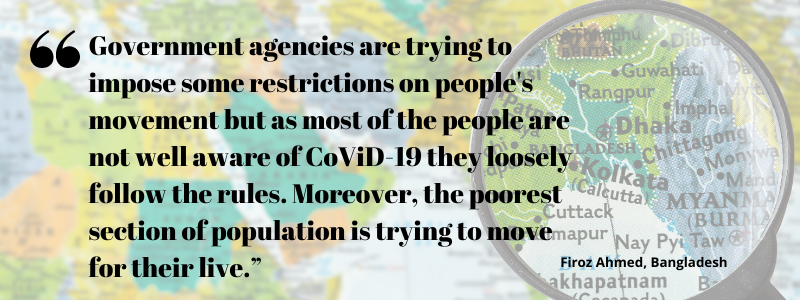
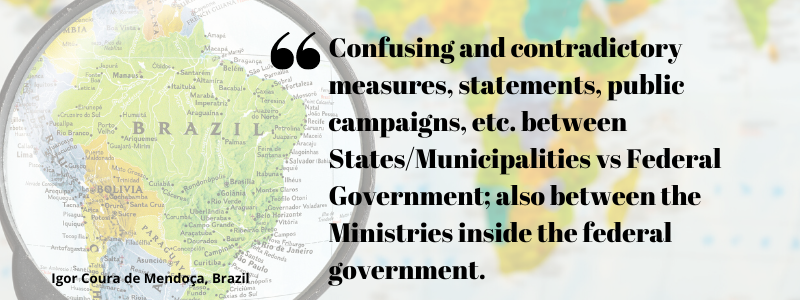

Click image for larger version.
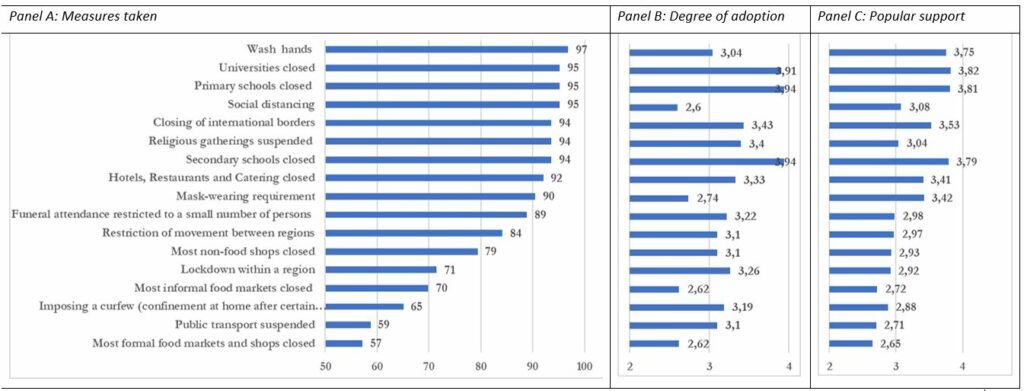
Consultation and Implementation
In most countries, respondents report that the measures were discussed with stakeholders, either ‘a lot’ (31%) or at least ‘somewhat’ (43%), while in less than one third of countries, respondents report that the measures taken have rather not (21%) or not at all (5%) been discussed. For most countries, key respondents reported that enforcement was either mild (27%) or strict but acceptable (43%). In one out of five countries (19%), respondents found the enforcement of the measures by security forces unacceptable but non-violent, and in two countries (3%) key respondents reported unacceptable violence by security forces. These respondents wish not to be named for safety reasons.
Click image for larger version.
We cross-correlated stakeholder consultation and the way of enforcement with the five Governance Indicators (Voice and Accountability, Political Stability and Absence of Violence/Terrorism, Government Effectiveness, Regulatory Quality, Rule of Law and Control of Corruption). We find very clear patterns, indicating a strong link between ‘a lot of consultation’ and ‘good governance’ and between ‘unacceptable (violent) enforcement’ and ‘bad governance’ (Figure 4, Panel A & B). For instance, countries with ‘a lot of consultation’ have a percentile rank of 52 on ‘Voice and Accountability’, on average, versus a rank of 39 for countries without any consultation. Even more strikingly, countries with ‘unacceptable and violent enforcement’ rank only in the 7th percentile, on average, for the indicator ‘Political Stability and Absence of Violence/Terrorism’ versus a percentile rank of 45 for countries with no enforcement.
Click images for larger version.
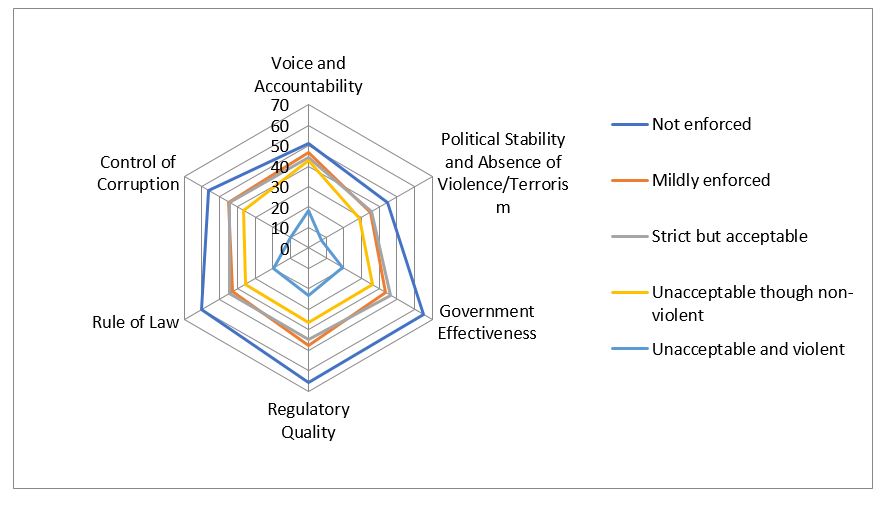
Socio-economic impacts of the crisis
Containment measures greatly affected the food supply chain. Survey respondents in most countries (79%) reported an increase in food prices, with the increase ranging between 5% and 10% in about half of the countries, and between 10% and 40% in a quarter of countries. In three countries food prices reportedly doubled (South Sudan, Zimbabwe and Cambodia).
The impact of the crisis on economic activity is perceived to be very substantial in 70% of the countries and rather substantial in 28%. When asked about remittances, respondents report a small decrease in 13% of the countries, a moderate decrease in 36% and a substantially decreasein 34%.
IOB Alumna Rhoda Natukunda (Uganda) describes the economic consequences in her country.“Businesses have had to lay off employees both permanently and temporarily, there’s limited access to agricultural inputs and constraints to accessing markets by farmers”. In the Philippines, “millions lost their jobs. The daily wage earners were most vulnerable. Farmers could not transport their produce. Income levels went down.” (Respondent prefers to remain anonymous). Similarly, “most of the workers in the informal sector (hawkers) experienced a reduction in income as most people choose to stay home. The cost of living has increased as prices of basic necessities and public transport kept increasing” in Cameroon (Respondent prefers to remain anonymous). Maria Jose Perez also reported that “a lot of people start hanging white flags to ask for food supplies because they can’t work to buy food” in Guatemala.

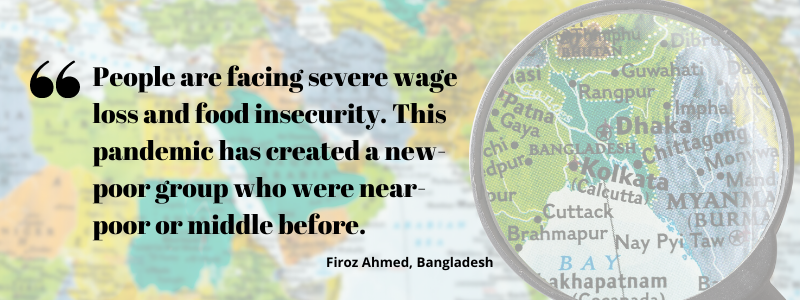
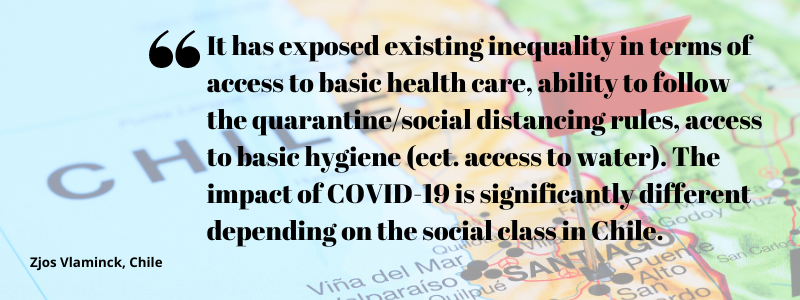
Click image for larger version.

Respondents mentioned several social protection measures that were put in place in order to soften the socioeconomic consequences of the crisis: delayed tax payments, low-or-no interest loans with flexible terms, cash grants, voucher schemes, distance learning programs, temporary unemployment benefits, subsidies to small businesses, delayed payment for utility services (water, electricity, internet connection and even house rent), etc.[1] A regularly updated overview of social protection measures in response to the COVID-19 pandemic is provided by Gentilini et al.
Broader repercussions
Beyond the economy, the corona crisis is perceived to have broader societal effects.
For example, in 61% of countries, respondents feel that solidarity and social cohesion among the population has increased. A concrete example is the “Proud Withstanding fund initiative whereby wealthy people donate to provide assistance to the poor”, as reported by Naser Qadous (Palestinian Territories). In a minority of countries (7%) cohesion is reported to have decreased. According to Rumbidzai Mpahlo (Zimbabwe), “People in poorer communities have noted that the conditions of the lockdown tend to benefit the rich and not them. While the home can be a space of refuge against this pandemic, it is not necessarily so in communities which are overcrowded, under-protected, under-serviced, marginalized and poor.” According to a respondent from the United States (who prefers to remain anonymous) the pandemic has“increased the death rate for Latino and Afro American populations due to structural inequalities, including difficulties to access social services”. Besides making existing inequalities between groups more visible, the pandemic also led to the emergence of new cleavages. John Folly Akwetey (Ghana) reports that “there were issues about stigmatization of mostly returned migrants, since people tag them as the carrier of the virus”.
Regarding the impacts of the crisis on education, Abu Said Juel Miah (Bangladesh) says “Distant classes aired through television or online classes have not yet been able to attract the students. The lower participation in distant learning is evident among the students from ethnic minorities, madrasas, children with disabilities, and those living in rural areas”.
Our respondents also foresee both political (in 9 countries out of 10) and gendered (in 8 countries out of 10) impacts of the Covid-19 crisis. Among the political consequences of the crisis are postponement of planned elections because of the lockdown and loss (or win) of political support depending on the crisis management by the government. For instance, alumnus John Folly Akwetey (Ghana) says: “Politically, we are in an election year in Ghana. If the situation with Covid-19 crisis persists, our country could face huge political crisis due to the fact that our constitution never made room for situation like this”. And Yohannes Abraha from Ethiopia reports: “the ruling party declared that the general election supposed to take place in September 2020 is postponed indefinitely till the end of the pandemic. Tigray region on its part rejected the decision to postpone election indefinitely and vow to hold election at regional level. In response to Tigray region’s announcement, the Ethiopian Prime Minister, Abiy Ahmed, threatened the region that the government should take measures, including military, should the region stick to its plan.” More generally, and as observed by Human Rights Watch, the coronavirus crisis may provide authoritarian-minded leaders with a convenient pretext to silence critics and consolidate power.
On the other hand, the pandemic has also provided citizens with a policy experiment to evaluate its leaders. In some countries this turned out in favour of the incumbents. Respondents from Vietnam and Uganda report that the government enjoys stronger support of the population. They have gained more trust from the people for effectively fighting the virus. In contrast, in both Ecuador and Nicaragua it is reported that ruling parties have lost trust and legitimacy, are widely criticized and may face severe consequence during the upcoming elections. In the same vein, “the outlook of reelection of President Trump has turned negative due to shortcomings in his administration’s response to the crisis and presidential communications”, says an anonymous alumnus reporting on the USA.
Other (potential) consequences of the crisis are the rise of nationalist discourses (Santiago Silva, Colombia) and of extreme/populist parties (2 anonymous, Belgium), an increase in xenophobic violence (Anonymous, reporting on South Africa); but also the emergence of new political figures (Zalwango Evelyn, Uganda), a shift from ethnic-based politics towards class based politics (Peter Kirui, Kenya) and an increased digitalization of political and mobilization activities (Kondwani Farai Chikadza, Malawi).
In a series of blogs based on this research project, we will dive deeper into issues such as gender, migration and M&E.
[1] For a complete description of coping measures taken by countries, refer to https://www.ugogentilini.net/wp-content/uploads/2020/05/Country-SP-COVID-responses_May22.pdf
Survey
The survey was created by Marijke Verpoorten, Sara Dewachter and Dimitri Renmans.
Student/alumni contributors
Henryson Jusu (Sierra Leone) ,Godfrey Bwanika (Uganda), Naisula Lepariyo (Kenya), Ana Júlia (Brazil) ,Cica Mathilda Dadjo (Benin), Rumbidzai Mpahlo (Zimbabwe), Lien Verbeeck (Belgium), Santiago Silva (Colombia), Samuel S. Omwa (Uganda), Tsegazeab Bezabih (Ethiopia), Salamula Jenipher Biira (Uganda), Dramane Bako (Burkina Faso), Roxane Lemercier (Belgium), Jonathan (Philippines), John Folly Akwetey (Ghana), Naser Qadous (Palestinian Territories), Idrissa Tamba Bindi (Sierra Leone), Manzo Abdourahamane (Niger), Juan Fernando Díaz Lara (Guatemala), Fernando Cando Ortega (Ecuador), Hervé Kouandé (Côte d’Ivoire), Tatevik Davtyan (Armenia), Mayank Sharma (India), Daniela Cristina (Argentina), Abeer Hakouz (Jordan), Bonnie Kiconco K. Mutungi (Uganda),John Melgarejo (Colombia), Maja Vukovic (Montenegro), Geraldine Bythell (Belgium), Camila Contreras (Chile), Huong Vu (Viet Nam), Dennis Penu (Ghana), Silvia González (Ecuador), Natalia Khabalova (Russian Federation), Alemayehu Semunigus (Ethiopia), Boltana Tesfaye Falaha (Ethiopia), Lorena Meza (Peru), Richard Temu (United Republic of Tanzania), Igor Coura de Mendonça (Brazil), Nurina Savitri (Indonesia),Isaac Senyonjo (Uganda), Manzoor E Khoda (Bangladesh), Carlos Allende González (Mexico), Aynul Islam (Bangladesh),Joseph Gana Zanyine (Cameroon), María José Pérez (Guatemala), Habtamu Alemu Jano (Ethiopia), Marcelo Clavijo (Bolivia), Le Le Lan (Viet Nam), Jazzie Alexander (Philippines), Firoz Ahmed (Bangladesh), Gersán Vásquez (Nicaragua), Chilufya Nchito (Zambia), Nancy Ampudia (Ecuador), Rusudan Kardava (Georgia), Thuy (Viet Nam), Cristina Rotaru (Estonia), Shulby Yozar Ariadhy (Indonesia), Zjos Vlaminck (Belgium), Lani Tang (Philippines), Eshetu Demissie (Ethiopia), Kelvin Chirwa (Malawi), Ana Guevara (Bolivia), Adeline Uwonkunda (Rwanda), Nguyen Dinh Tuan (Viet Nam), Ousséni Kinda (Burkina Faso), Abu Said Juel Miah (Bangladesh), Isah Matovu (Uganda), Kondwani Farai Chikadza (Malawi), Annette Kyakuwa Mutoni (Uganda), Pedro Samuel Zapil (Guatemala), Joy Valerie Lopez-Tancioco (Philippines), Abdurahman Hamza (Ethiopia), Yeabsira Tamerat Delelegne (Ethiopia), Maria-Jose Rivera (Ecuador), Dieter Gijsbrechts (Belgium), Dilip Raj Bhatta (Nepal), Kefa Kawanguzi (Uganda), Lovy Rasolofomanana (Madagascar), Maazullah Mamond (Afghanistan), Laura López Muñoz (Colombia), Arsyoni Buana (Indonesia), Nyamadzawo Sibanda (Zimbabwe), Abraham Getachew (Ethiopia), Sharda Khanal (Nepal), Harold Mabwe (United Republic of Tanzania), Arthur Katongole (Uganda), Hauvre Somova (Philippines), Ndille Ndille Kogge (Cameroon), Fatoumatta Saho (Gambia), A H M Belayeth Hussain (Bangladesh), Chrispine Botha (Malawi), Monica Patricia Niño Peña (Colombia), Pierre Merlet (Nicaragua), Cornelius Habeene Muvwema (Zambia), Nahid Sharmin (Bangladesh), Lucia López (Peru), Mikiti M’panda Henry (Democratic Republic of the Congo), Lanny Jauhari (Indonesia), Essa Chanie Mussa (Ethiopia), Michael Gison (Philippines), Grace Dingase Chisamya (Malawi), Eddah Kanini (Kenya), Huong Giang Tran (Viet Nam), Rhoda Nkubah Natukunda (Uganda), Awuor Ponge (Kenya), Joel Siku (Democratic Republic of the Congo), Andrea Mazzini (Ecuador), Veronica Notaro (Italy), Narayan Gyawali (Nepal), Jamie Robertsen (South Africa), Shanjida Shahab Uddin (Bangladesh), Jones Mulenga Bowa (Zambia), Abhinav Alexander Dutt (India), Dejen Minyilu Aragaw (Ethiopia), Sarah Vissers (Netherlands), Nkengfua Alexander (Cameroon), Claudia V. López (Guatemala), Marianelly (Peru), Arnoux Mouafo Nopi (Cameroon), Roy Mutandwa (Zimbabwe), Achem Nkongho Princewill (Cameroon), Zahira Auladin (Mauritius), Ajadi Moheed Adenkunle (Nigeria), Mshinwa Edith Banzi (United Republic of Tanzania), Getachew Dinsa Amente (Ethiopia), Rose P. Villar (Philippines), Tumusiime Collins (Uganda), Al Hassan Cisse (Senegal), Alexandra Maldonado Nuñez (Ecuador), Zalwango Evelyn (Uganda), Kubalasa Dalitso (Malawi), Paul Arias (Ecuador), Zerihun Berhane Weldegebriel (Ethiopia), Mary Chilala (Zambia), Angeline Ndabaningi (Zimbabwe), Ali Agören (Turkey), Trosy (Zimbabwe), Nicholas Mugabi (Uganda), Peter Kirui (Kenya), Wendy Garcia (Nicaragua), Mugisho Chihyoka Laurent (Democratic Republic of the Congo), Gonzalo Antonio Bilbao La Vieja Ruiz (Bolivia), Mapudi Eric Morakiwa (South Africa), Ferdous Farhana Huq (Bangladesh), Yohannes Abraha (Ethiopia), William Pallangyo (United Republic of Tanzania).



